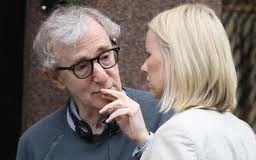
You Will Meet A Tall Dark Stranger
Considering Woody Allen, 74, makes a film a year, the question to be asked is not why so many of his movies are uneven, but why so many are to be treasured. Even in this past decade, there's been Vicki Cristina Barcelona (2008), Match Point (2005), Hollywood Ending (2002), and Small Time Crooks (2000). Although none achieve the magic, wit, or depth of Crimes and Misdemeanors (1989), The Purple Rose of Cairo (1985), or Annie Hall (1977), they all are embraceable entertainments, worthy of numerous viewings. You Will Meet a Tall Dark Stranger, however, is middling Woody. Not unwatchable as The Curse of the Jade Scorpion (2001) or as annoying as Melinda and Melinda (2004), the film still has a rushed quality to it. The proof is a horrendously off-putting voiceover (supplied by a dreadful Zak Orth) that is consistently employed to fill in plot points the screenplay is unable to incorporate with any grace.
The tale centers on upon a divorced couple, Alfie (Anthony Hopkins) and Helena (Gemma Jones). After 40 years of wedded life, Alfie has developed a fear of aging and winds up marrying Charmaine (Lucy Punch), a youngish prostitute, whom he satisfies with the aid of Viagra and his dwindling bank account.
A distraught Helena, at loose ends, seeks the aid of Cristal (Pauline Collins), a fortune teller, who convinces her of her former glamorous lives and a future romance.
Meanwhile, the marriage of the ex-couple's daughter Sally (Naomi Watts) to a one-time promising writer, Roy (Josh Brolin), is falling apart. She's attracted to her boss (Antonio Banderas) and he has the hots for his neighbor, a young guitar-playing woman in red (Freida Pinto).
All the ingredients are here for a successful Woody romp, but they never gel. Bookended between Shakespearean quotes and the tune "When You Wish Upon a Star," the film seems more the product of a work-for-hire sensibility than an inspired act of love. The bon mots are few and far between. The cinematography by Vilmos Szigmond (Close Encounters of the Third Kind) is seldom flattering to the stars. And numerous scenes are awkwardly staged.
Yet Jones as the alcoholic, dithering Helena, Collins as her soothsayer, and Roger Ashton-Griffiths as her new beau, are splendid, and Lucy Punch steals the show. As she did in Dinner for Schmucks playing the nightmare ex-date of all time, Punch supplies a high-powered comic energy that makes you mope every time the camera leaves her presence.
In conclusion, my prognostication for this bit of celluloid is that it will encounter a short, overlooked run in the theaters and be favored with a few clicks now and then on Netflix. As Woody himself has noted, "If you're not failing every now and again, it's a sign you're not doing anything very innovative."
